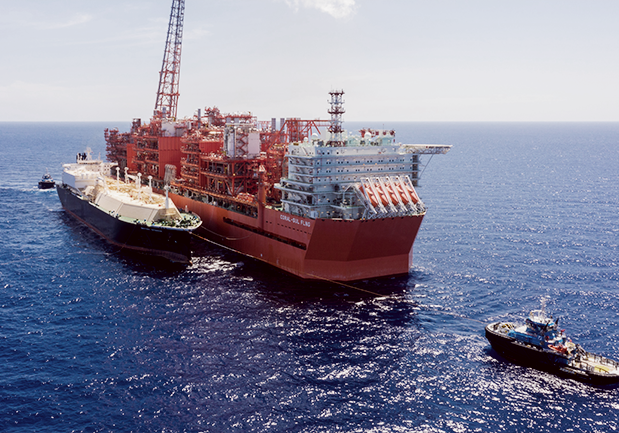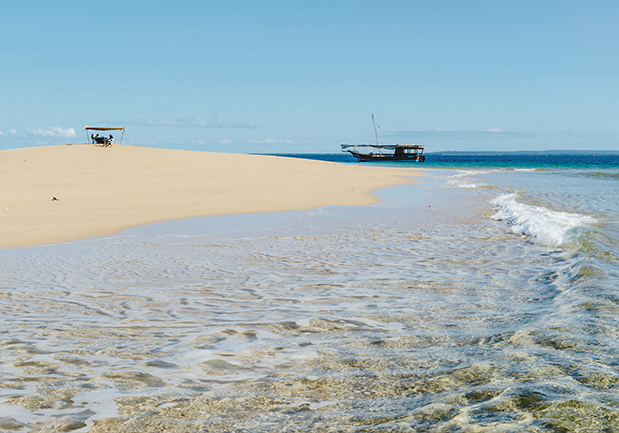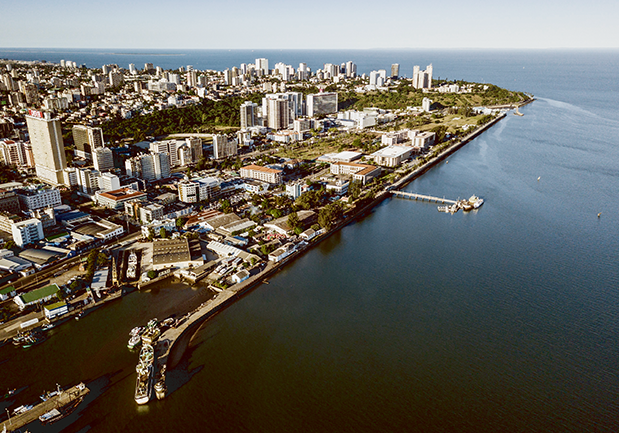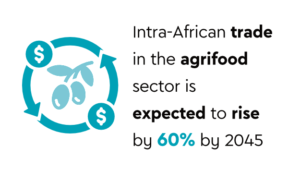In November 2022 Mozambique took the initial steps in helping Western Europe alleviate a serious energy crisis. That month saw the first shipment of LNG by oil supermajor BP from the Coral Sul floating LNG (FLNG) vessel off the north coast of the country. Anchored in the Rovuma basin – the site of the huge offshore gasfields discovered more than a decade ago – the Coral Sul is linked to six subsea gas-producing wells.
The Coral Sul has the capacity to produce up to of 3.4 million tons of LNG a year (mtpa), according to BP, which has the rights to the vessel’s output, equal to about one-third of the UK’s LNG imports in 2021.
Carol Howle, executive VP of trading and shipping at BP, notes that ‘the start of production from the Coral Sul FLNG facility represents a major milestone for Mozambique. […] As the world seeks secure, affordable and lower-carbon energy, global demand for LNG is expected to continue to grow’.
The world’s energy markets were thrown into turmoil following the Russian invasion of Ukraine early in 2022, with the International Energy Agency warning that European gas markets were bracing ‘themselves for a winter of unprecedented uncertainty of supply’. Western sanctions against Russia and the cutting off of Russian gas supplies to certain regions compounded the uncertainty.
‘The benefits of [Mozambique’s] first export go beyond supply easings internationally,’ according to a report by Charné Hollands of Energy Capital & Power.
‘For Mozambique, the commercialisation of offshore gas reserves will bring in significant export revenues that can help kickstart industrialisation and broader socio-economic growth for the developing nation.
‘With the project set to position the country as one of the world’s top 10 biggest LNG exporters, the associated influx in foreign revenue will be key to accelerating both infrastructure and sub-sector development. The country expects to make an estimated US$96 billion in revenue over the lifetime of the Rovuma gas reserves – approximately five times the country’s current GDP. While Coral Sul is focused predominantly on exports, its start of production signals new opportunities for other projects in the basin to resume development, thereby increasing domestic capacity and regional exports.’
Mozambique, one of the world’s poorest countries, had high hopes for the offshore gas discoveries – among the largest in sub-Sahara Africa – as a means to spur economic growth.
Despite huge initial interest from many global oil companies, however, the plans have been stalled in recent years, mostly owing to security concerns highlighted by a simmering insurgency in the northern Cabo Delgado province that has killed more than 4 000 people.
Companies such as TotalEnergies, which had a US$20 billion, 12.8 mtpa onshore LNG project under development, declared force majeure in 2021 and halted the project. This year, though, following concerted joint military efforts to quell the insurgents, there has been renewed activity on the commercial front.

TotalEnergies, according to a Reuters report, has mandated ‘an expert in humanitarian action and human rights to carry out an independent mission to assess the humanitarian situation in the province before taking a decision on a restart of operations’.
In March, meanwhile, ExxonMobil stated it was considering restarting its proposed LNG plant in Mozambique – with a bigger capacity than initially planned.
Mozambican newspaper O Pais reported that the US firm was calling for expressions of interest to design and build an 18 mtpa plant (previously it wanted to build one with a 15.2 mtpa output).
While Mozambique is banking heavily on its gas reserves, the country also has several other attributes for potential foreign investment.
‘The country is endowed with ample resources of arable land, water and energy, as well as mineral resources and newly discovered natural offshore gas; three deep seaports; and a relatively large potential pool of labour,’ reports the World Bank.
‘It is also strategically located: four of the six countries it borders are landlocked and hence dependent on Mozambique as a conduit to global markets. Mozambique’s strong ties to the region’s economic engine, South Africa, underscore the importance of its economic, political and social development to the stability and growth of Southern Africa as a whole.’
The organisation says the country’s economic recovery ‘is picking up steam’ with growth hitting 4.1% last year.
‘The medium-term economic outlook is positive, with growth expected to accelerate to 6% over 2023 to 2025, driven by continued recovery in services, increased liquefied natural gas production, and high commodity prices. However, downside risks linked to climate shocks, security risks, and food and fuel price pressures could lower medium-term GDP growth to 4.5%,’ according to the 9th edition of the bank’s Mozambique Economic Update.
It adds, however, that Mozambique needs to diversify ‘from reliance on low-productivity agriculture and extractives to a development model’, based on diversified sources of growth, productivity, and jobs.
‘Looking ahead, sustained, broad-based and inclusive growth will require raising productivity in services and stimulating the formalisation of informal firms while strengthening linkages between sectors,’ says Idah Pswarayi-Riddihough, the World Bank’s country director for Mozambique, Madagascar, Mauritius, Comoros and Seychelles. ‘Services could be an avenue toward inclusive growth and accelerated job creation.’
While the government took some action in August last year to aid recovery via ‘a package of economic acceleration measures’, the World Bank says there is a need ‘for reforms that can strengthen the role of the private sector and promote access to finance by lowering the cost of bank credit, as well as offering credit guarantees to small enterprises’. It adds that ‘[the government] further recognises the need to upgrade services into more sophisticated activities, such as ICT, finance, and professional and business services, for the sector to become an engine of inclusive growth and employment creation’.
On 31 March 2023, the bank approved US$300 million in credit for the Mais Oportunidades project, spanning six years (2023 to 2029), financed by the International Development Association.
‘The World Bank will support the government of Mozambique to address multiple economic shocks and market constraints that prevent micro, small and medium enterprises and individuals, including informal workers, from accessing and using financial services and taking advantage of economic opportunities,’ says Pswarayi-Riddihough.
The project includes the creation of a national Credit Guarantee Fund, a first for the country, to help ‘mobilise liquidity in the banking system and unlock financing to SMEs’. It is also expected to increase economic opportunities by deepening business environment reforms, expanding market access, and providing training and financing.
‘Generating enough jobs, particularly green and productive jobs, is a critical challenge for Mozambique,’ says the bank. ‘To keep pace with the country’s young and rapidly growing population, estimated to reach 50 million by 2040, the economy must create 500 000 jobs every year – 20 times the 25 000 formal jobs currently created annually.
‘The private sector, mainly comprised of informal, low-productivity and small-scale enterprises, struggles to provide sufficient employment opportunities. This is partly due to structural challenges in accessing finance – particularly credit – which hampers businesses’ growth and development. MSMEs, especially women-owned or -led, are acutely exposed to climate and economic shocks exacerbated by limited access to financial products to mitigate these risks.’

The impacts of climate change have been heavily felt in Mozambique as the country – which has a 2 500 km-long coastline – is directly in the path of many tropical cyclones that experts maintain are becoming more destructive in force. In February and March this year, for example, Cyclone Freddy hit the country twice over its five-week lifespan, causing massive flooding and damage and closing around 1 000 schools, according to UNICEF. In some areas, a year’s worth of rainfall was recorded in just a month. Although just as Mozambique’s long coastline has made it vulnerable to natural disasters, its warm tropical waters and unspoilt offshore islands have proved also to be a tourism blessing.
Tourism is one area in that Mozambique is keen to develop, and it has been striving to attract more international visitors since the end of the civil war in 1992.
Game parks such as the famed Gorongosa National Park, once devastated by rampant poaching, have been restocked and revitalised by the government’s entry into partnerships with private companies to provide expert services. Like most of Africa, the COVID pandemic decimated tourism but the government has implemented the Strategic Plan for the Development of Tourism 2016 to 2025, which aims to ‘make Mozambique one of the most vibrant, dynamic and exotic tourist destinations in Africa by 2025’.
In October last year at the Fikani tourism fair in Maputo, President Filipe Nyusi noted in his address that international tourist arrivals were expected to reach between 55% and 70% of 2019 levels by the end of 2022. He said that tourism establishments had collected about MT844 million (US$13.2 million) in revenue during the first quarter of last year, an 18.4% rise over the same period in 2021.
‘Obviously, these numbers still do not satisfy us, which is why, with a view to raising production and productivity in the strategic sectors of which tourism is a part, we launched the Economic Acceleration Measures programme, in which tourism is covered,’ he said. ‘In this mission, we are all invited to do our best to transform tourism into a catalyst for the diversification of the national economy.’


















